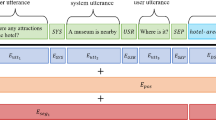Abstract
Current data-driven Dialogue State Tracking (DST) models exhibit a poor capacity to adapt themselves to domain changes, resulting in a significant degradation in performance. We propose a methodology, called Generative Dialogue Domain Adaptation, which significantly simplifies the creation of training data when a number of changes (e.g., new slot-values or new instances) occur in a domain Knowledge Base. We start from dialogues for a source domain and apply generative methods based on language models such as BERT, fine-tuned on task-related data and generate slot-values substitutions for a target domain. We have experimented dialogue domain adaptation in a few-shot setting showing promising results, although the task is still very challenging. We provide a deep analysis of the quality of the generated data and of the features that affect this task, and we emphasise that DST models are very sensitive to the distribution of slot-values in the corpus.
Access this chapter
Tax calculation will be finalised at checkout
Purchases are for personal use only
Similar content being viewed by others
Notes
References
Andrews, G.E.: The geometric series in calculus. Am. Math. Mon. 105(1), 36–40 (1998). https://doi.org/10.1080/00029890.1998.12004846
Balaraman, V., Magnini, B.: Domain-aware dialogue state tracker for multi-domain dialogue systems. IEEE/ACM Trans. Audio Speech Lang. Process. 29, 866–873 (2021). https://doi.org/10.1109/TASLP.2021.3054309
Balaraman, V., Sheikhalishahi, S., Magnini, B.: Recent neural methods on dialogue state tracking for task-oriented dialogue systems: a survey. In: Li, H., et al. (eds.) Proceedings of the 22nd Annual Meeting of the Special Interest Group on Discourse and Dialogue, SIGdial 2021, Singapore and Online, 29–31 July 2021, pp. 239–251. Association for Computational Linguistics (2021). https://aclanthology.org/2021.sigdial-1.25
Devlin, J., Chang, M.W., Lee, K., Toutanova, K.: BERT: pre-training of deep bidirectional transformers for language understanding. In: Proceedings of the 2019 Conference of the North American Chapter of the Association for Computational Linguistics: Human Language Technologies, Volume 1 (Long and Short Papers), pp. 4171–4186. Association for Computational Linguistics, Minneapolis, June 2019. https://doi.org/10.18653/v1/N19-1423, https://www.aclweb.org/anthology/N19-1423
Feng, Y., Wang, Y., Li, H.: A sequence-to-sequence approach to dialogue state tracking. arXiv preprint arXiv:2011.09553 (2020)
Han, T., et al.: Multiwoz 2.3: a multi-domain task-oriented dataset enhanced with annotation corrections and co-reference annotation. arXiv preprint arXiv:2010.05594 (2020)
Henderson, M., Thomson, B., Williams, J.D.: The second dialog state tracking challenge. In: Proceedings of the 15th Annual Meeting of the Special Interest Group on Discourse and Dialogue (SIGDIAL), pp. 263–272. Association for Computational Linguistics, Philadelphia, June 2014. https://doi.org/10.3115/v1/W14-4337, https://www.aclweb.org/anthology/W14-4337
Labruna, T., Magnini, B.: Addressing slot-value changes in task-oriented dialogue systems through dialogue domain adaptation. In: Proceedings of RANLP 2021 (2021)
Labruna, T., Magnini, B.: From Cambridge to Pisa: a journey into cross-lingual dialogue domain adaptation for conversational agents (2021)
Madotto, A., Liu, Z., Lin, Z., Fung, P.: Language models as few-shot learner for task-oriented dialogue systems. arXiv preprint arXiv:2008.06239 (2020)
Magnini, B., Louvan, S.: Understanding Dialogue for Human Communication, pp. 1–43. Springer, Cham (2021). https://doi.org/10.1007/978-3-030-44982-7_20-1
McTear, M.: Conversational AI: Dialogue Systems, Conversational Agents, and Chatbots. Morgan and Claypool Publishers, San Rafael (2020). https://doi.org/10.2200/S01060ED1V01Y202010HLT048
Rastogi, A., Zang, X., Sunkara, S., Gupta, R., Khaitan, P.: Towards scalable multi-domain conversational agents: the schema-guided dialogue dataset. In: The Thirty-Fourth AAAI Conference on Artificial Intelligence, AAAI 2020, The Thirty-Second Innovative Applications of Artificial Intelligence Conference, IAAI 2020, The Tenth AAAI Symposium on Educational Advances in Artificial Intelligence, EAAI 2020, New York, NY, USA, 7–12 February 2020, pp. 8689–8696. AAAI Press (2020). https://aaai.org/ojs/index.php/AAAI/article/view/6394
Wu, C.S., Madotto, A., Hosseini-Asl, E., Xiong, C., Socher, R., Fung, P.: Transferable multi-domain state generator for task-oriented dialogue systems. In: Proceedings of the 57th Annual Meeting of the Association for Computational Linguistics, pp. 808–819. Association for Computational Linguistics, Florence, Italy, July 2019. https://doi.org/10.18653/v1/P19-1078, https://www.aclweb.org/anthology/P19-1078
Young, S., et al.: The hidden information state model: a practical framework for POMDP-based spoken dialogue management. Comput. Speech Lang. 24(2), 150–174 (2010)
Zhao, J., Mahdieh, M., Zhang, Y., Cao, Y., Wu, Y.: Effective sequence-to-sequence dialogue state tracking. arXiv preprint arXiv:2108.13990 (2021)
Author information
Authors and Affiliations
Corresponding authors
Editor information
Editors and Affiliations
Rights and permissions
Copyright information
© 2022 Springer Nature Switzerland AG
About this paper
Cite this paper
Labruna, T., Magnini, B. (2022). Fine-Tuning BERT for Generative Dialogue Domain Adaptation. In: Sojka, P., Horák, A., Kopeček, I., Pala, K. (eds) Text, Speech, and Dialogue. TSD 2022. Lecture Notes in Computer Science(), vol 13502. Springer, Cham. https://doi.org/10.1007/978-3-031-16270-1_42
Download citation
DOI: https://doi.org/10.1007/978-3-031-16270-1_42
Published:
Publisher Name: Springer, Cham
Print ISBN: 978-3-031-16269-5
Online ISBN: 978-3-031-16270-1
eBook Packages: Computer ScienceComputer Science (R0)




